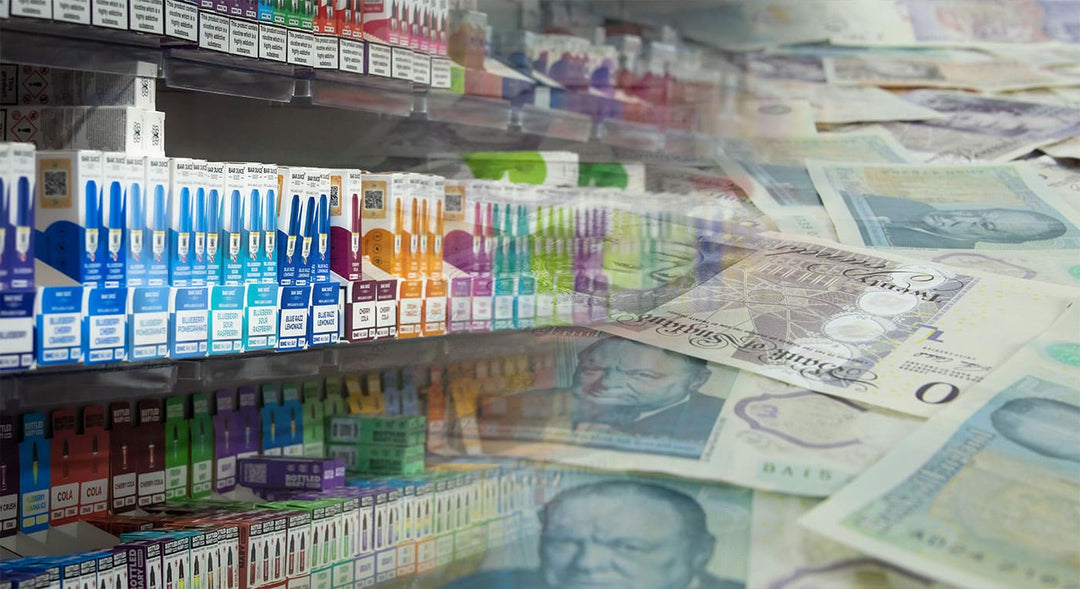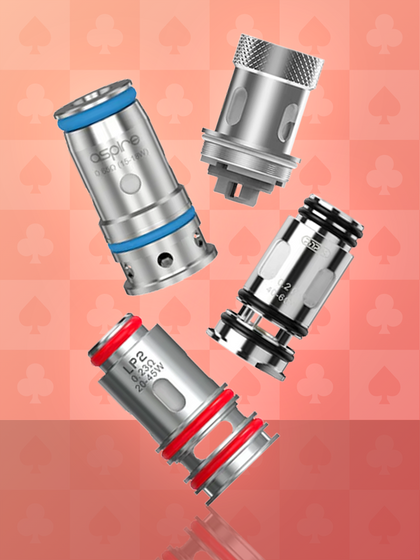UK Vape Tax - Everything You Need to Know
Mar 11, 2024

Introduction
If you are not already aware, the government announced plans for a new vape tax during the 2024 Spring Budget [1] presented by The Chancellor of the Exchequer, Jeremy Hunt in Parliament on Wednesday 6th March 2024. Hunt stated that the new tax will be introduced on 1st October 2026 after following a consultation.
This leads on from the Disposable Electronic Cigarettes (Prohibition of Sale) Bill, known as the UK disposable vape ban which was announced in January 2024 by Prime Minister, Rishi Sunak [2]. Although both of these latest announcement differ, they are both part of the Governments smokefree 2030 ambition to create a smokefree generation and to tackle youth vaping.
In this informative article, we break down the latest vape tax UK announcement address how much money the government want to add to e-liquids and nicotine containing liquids along with everything that you need to know about how this could potentially effect you and the 4.5 million vapers within the UK.
Summary: UK Government announced a tax on vapes in their 2024 Spring Budget. E-liquids will be taxed in on the 1st October 2026 by £1 per 10ml if nicotine free, £2 per 10ml if up to 10.9mg, or £3 per 10ml if 11mg or stronger. The tax could prevent many smokers switching to vaping or lead vapers back to cigarettes. The tax is currently going through a 12 week consultation where you can have your input.
Why is the UK taxing vapes?
The UK Government are currently tackling the rise in youth vaping and the imports and sales of illegal and non compliant vapes throughout the country. They believe that by rising the tax on vapes, they can greater control the import and sales of vape related products.
Jeremy Hunt stated during the 2024 Spring Budget that this latest vape duty was intended to "discourage non-smokers from taking up vaping", however chapter 3 of Vaping Products Duty Consultation [3] highlights further objectives of the tax as below:
- To reduce the number of non-smokers and young people that vape by reducing the affordability of vaping products in recognition that vaping is not risk free
- To encourage consumers to choose lower strength or nicotine-free vaping products over higher strength ones due to the harms from nicotine addiction
- To encourage manufacturers of vaping products to reduce the nicotine content of their products
- To raise revenue to fund vital public services such as the NHS and smoking initiatives supporting a smokefree generation
- To ensure that the duty is proportionate to administer for both businesses and HMRC
- To ensure the introduction of the duty does not make smoking more attractive
What is the current tax on vapes?
To understand the true impact that the proposed vape tax could have, it's important to be aware of the current costs on vaping products that you may currently purchase.
Currently, there is no specific tax rate on any vape related products. This means that vapes, e-liquids, and related products are only subject to the standard 20% VAT rate. Although there is the possibility of medically licensed vapes being prescribed which would reduce the rate to 5%, there is currently no vape related product that has gained the medical licensing to qualify for this.
How much will vapes be when taxed?
As it stands, the excise tax on vaping will raise £120 million in 2026-7 rising to £445 million by 2028-9. The UK government propose three separate tax categories which include both nicotine containing and nicotine free liquids as follows:
- £1.00 per 10ml for nicotine free liquids,
- £2.00 per 10ml on liquids that contain 0.1-10.9mg nicotine per ml, and
- £3.00 per 10ml on liquids that contain 11mg or more per ml.
- In addition to the new tax on e-liquids, the UK government will also introduce a one-off tobacco duty increase of £2.00 per 100 cigarettes or 50 grams of rolling tobacco which will will see the standard 20 packet of cigarettes rise by a further £0.40.
Although it's difficult to work out exactly how much vapes will be once taxed, we've worked out the average prices of e-liquids currently available and added on the tax to work out how much e-liquids could cost the average consumer per bottle once they are taxed in 2026 as follows:
| E-Liquid Type | Average Price | With Tax Added |
| 10ml Freebase ≤10.9mg | £3.99 | £5.99 |
| 10ml Freebase ≥10.9mg | £3.99 | £6.99 |
| 10ml Nic Salt ≤10.9mg | £3.99 | £5.99 |
| 10ml Nic Salt ≥11mg | £3.99 | £6.99 |
| 11mg-18mg Nic Shot | £1.00 | £4.00 |
| 50ml Shortfill | £9.99 | £14.99 |
| 50ml Shortfill (3mg) | £10.99 | £15.99 |
| 100ml Shortfill | £14.99 | £24.99 |
| 100ml Shortfill (3mg) | £16.99 | £26.99 |
It's important to highlight that these prices are based of their current average and prices may change considerably between now and the proposed implementation of the vape tax in 2026. Although prices may be lowered where ever possible, other price factors over the next couple years could alter them too.
Either way, by looking at the prices more clearly, it seems that sub ohm vapers will be some of the biggest hit by the new vape tax on shortfill e-liquids, especially if they add nicotine to their vapes, although those vaping nic salts or freebase 10mls will also experienced a sharp increase in the cost to their e-liquids. Below we discuss the implications that this increase could have on both current vapers, or those looking to quit smoking with vaping.
Will they add tax to disposable vapes?
The vape duty tax will be applied to all e-liquids regardless of their nicotine content. However, disposable vapes have already been set to be banned by 2025, which of course is before the tax is set to go ahead. With this in mind, disposable vapes will not be taxed before they are banned.
When will the UK tax vapes?
The Chancellor of the Exchequer, Jeremy Hunt stated during the Spring Budget 2024 that the government plan to add the proposed tax to e-liquids and nicotine containing liquids on 1st October 2026. This will however still need to go through a 12 week consultation [4] before going ahead as announced.
With over two years from announcement to implementing the tax, it's clear that taxing vaping products is not a straightforward process and requires a lot of thought and consultation to ensure that it does not impact the millions of vapers in the UK who have switched from harmful tobacco.
Impact of vaping duty tax
Although increasing the tax on vapes will provide further powers to the likes of UK Border Force and HMRC to help reduce the import of illegal vapes which is welcomed by Royal Flush Vape, there are serious concerns on how this will impact the millions of vapers in the UK who have already switched from traditional tobacco, or how this could prevent those looking to switch to vaping as a healthier alternative.
The additional tobacco tax is welcomed as it keeps vaping cheaper which is vital in encouraging smokers to attempt quitting cigarettes with vaping as an accessible alternative, however, this tax would see the likes of nic salts rising by £3 which make the average 10ml e-liquid RRP close to £7. In addition, vapers will also need to purchase their vape kit alongside their coils or pods which should all be taken into account.
According to the UK Government a 10ml e-liquid is the same as 100 cigarettes, however, with the advancement in e-cigarettes and longer drags with vaping, this is not a guaranteed measure and for this reason could possibly make price of vaping much closer to smoking when accounting for accessories and the variation. If there isn't much difference in the price it could lead those vaping back to cigarettes, or prevent those looking to quit smoking access to e-cigarettes and e-liquid.
It's worrying that although the National Health Service (NHS) and Public Health England (PHE) highlight vaping as a healthier alternative to smoking, with the NHS further stating that vaping [is] one of the most effective tools for quitting smoking [5], the vape tax could put off and prevent many smokers moving to the healthier alternative with vaping.
Can the vape tax be prevented?
It's important to get the message across to the UK Government that their latest measures could negatively impact current vapers and prevent smokers from taking up the healthier alternative. The Government are holding a consultation for individuals, organisations, and businesses which we advise anybody worried about the implications of the latest tax to respond.
You can also contact your local MP with any worries or concerns you have here.
Vape tax media and press inquires
Here at Royal Flush Vape we value and respect the importance the media plays in education; we are committed to working alongside journalists and members of the media to provide professional and transparent content for any queries you may have.
Our expert team of copywriters, marketing specialists, photography, and video editors are committed to work closely with members of the media to provide industry quotes and data on a broad spectrum of topics.
Partnered with the UKVIA (UK Vaping Industry Association), Living Wage, and 1account, we are on the front line educating consumers with the latest facts and guidance on smoking cessation whilst ensuring we limit future generations from picking up the habit of smoking.
For press and media inquiries, please be sure to contact us.
Conclusion
The UK Government's announcement of a new vape tax, set to be implemented in 2026, marks a welcomed step to tackle youth vaping and the import and sale of illegal vape products. However, the proposed tax, ranging from £1 to £3 per 10ml based on nicotine content raises concerns about its potential impact on current vapers and those seeking to quit smoking with vaping.
As well as possibly putting current vapers off, the tax may also deter smokers to switch to vaping as a smoking cessation tool despite endorsements from health organisations.
The consultation period runs for 12 weeks and is an ideal time for you to raise your issues faced with this tax if applicable if any change to the tax would possibly happen.
We'd love to hear what your thoughts are on the latest vaping tax. Please be sure to leave a comment below to share how you believe this will impact you!
Frequently asked questions (FAQ)
Not currently, however, the UK Government announced in their 2024 Spring Budget that vape e-liquids will be taxed in 2026 regardless if the contain nicotine or not. The vape tax will see nicotine free e-liquids being hit with an extra £1 per 10ml, liquids with 0.1mg and 10.9mg having an additional £2 per 10ml, and e-liquids containing 11mg or more having an extra £3 per 10ml added.
Currently vapes are not taxed the same as cigarettes, they are only subject to the standard 20% VAT rate. However, in 2026 the UK Government will be adding duty tax to all vaping e-liquids with varying levels of tax related to their nicotine strength, which also includes £1 per 10ml for e-liquids that do not contain nicotine.
The UK Government have announced a tax on vapes which will come into force in October 2026. The excise tax on vaping will raise £120 million in 2026 - 2027 which will rise to £445 million by 2028 - 2029.
Yes. Vaping will be taxed in October 2026 by the UK Government as they continue to worry about youth access to vaping and the rise in illegal and non-compliant vape products and e-liquids. The tax will be applied to all e-liquids regardless of their nicotine content.
The UK vape tax will be applied in 2026. Going off current duty that will be applied, the UK Government will add £1 per every 10ml of nicotine free e-liquid used in shortfill or longfill bottles which will add £5 to 50mls and £10 to 100mls before any nicotine shots are added.
The UK vape tax in 2026 will add £1 per 10ml nic salt bottle up to a 10.9mg nicotine strength and £2 per bottle if its 11mg or higher in strength. This could bring the average price of nicotine salt e-liquids up to £6.99 per bottle as of October 2026.
Disclaimer: The content on www.royalflushvape.co.uk offers general insights about vaping and vape related products. Please be aware that this information is not meant to be a substitute for medical advice and should only be relied upon when explicitly referenced. We make no guarantees regarding the accuracy, reliability, or health-related advantages of the content displayed across all pages of our website, including blog posts, product pages and social media content.





Leave a comment